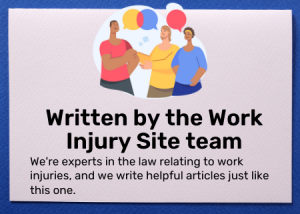WorkCover light duties – what you need to know

If you suffered injury at work and you cannot do the same work as before your injury, you may need to go on light duties.
Sometimes these are referred to as modified duties.
If you have an accepted WorkCover claim you are expected to remain on the job and work in some capacity if it is determined that you can safely perform some duties.
The information below relates to the Victorian WorkCover system.
Table of Contents
Light duties examples
Lets say you were employed in a timber mill doing a job that involved heavy work. Plenty of lifting, twisting and manoeuvring timber. And as a consequence of the work, you suffered injury to your shoulder.
Your doctor may determine that for a certain period of time, you should not lift anything over 10kg in weight, or engage in any repetitive use of your arm.
Depending upon the nature of the injury your doctor may say that you’re not allowed to lift anything at all.
In this case, examples of light duties may be involve doing administrative work in the office, or performing a supervisory role.
Other restrictions that you may be subjected to include:
- No heavy lifting repeated repeated bending
- No repetitive gripping or grasping
- No pushing or pulling over a certain weight
- No bending or twisting at the waist
- No kneeling, squatting, prolong standing walking or climbing stairs.
Light duty work hours
Sometimes, a restriction in work capacity focuses more on the hours of actual work rather than the duties.
For example, a doctor might say you’re ok to perform all of the duties in your pre injury role, but that you must only work for half the hours.
A common thing you’ll see with WorkCover matters is a graduated return to work. So if there has been a reduction in work hours, that will gradually be increased over a number of weeks or months.
Does my employer have to provide light duties?
If you can’t do your normal job because of your injury, your employer has at the very least, an obligation to provide you with light or suitable duties.
The obligation on the employer to provide you with light duties continues for a period of 52 weeks. This may not be 52 consecutive weeks as it only takes into account those periods that you cannot do your full pre-injury duties and hours as a result of your work related injury.
What if my employer doesn’t have any light duties?
In this case, you do not have to return to work with this employer and you are entitled to be paid WorkCover payments by the insurer.
Who determines what’s appropriate regarding light duties?
You’re treating general practitioner will be sent a proposed return to work plan.
This return to work plan will be completed by the occupational rehab provider that was engaged by the insurance company, in conjunction with your employer.
Your GP, after considering your work duties, will either agree with the proposed return to work plan, or will make suggestions to modify the plan.
For this reason it is very important that your treating doctor understands the full extent of your duties and what’s involved in your day to day work.
It’s always a good idea to meet with your general practitioner and discuss your duties with them and ensure that they are on the same page as you in terms of your duties and a return to work plan.
If your ability to work changes, this will be noted on your WorkCover certificate/certificate of capacity by your doctor.
What if I refuse to work the light duties?
If your doctor has signed off on a return to work plan involving light duties and you do not wish to undertake the light duties offered, there is a possibility that the insurance company could terminate your benefits.
If you think the light duties are not appropriate given the nature of your injury, you should speak to your doctor and ensure they are fully aware of your concerns.
What if my employer asks me to do work which is over and above my light duties?
This is quite a common question asked by injured workers. In this case, you should remind the employer as to what is appropriate given the agreed to return to work plan.
If that does not address the issue, you should speak to your general practitioner and ask them to write a letter setting out why it is important that you abide by the restrictions in the return to work plan. You should also let the insurance company know.
If you’ve suffered an injury but are still working, you can read more at this page.







